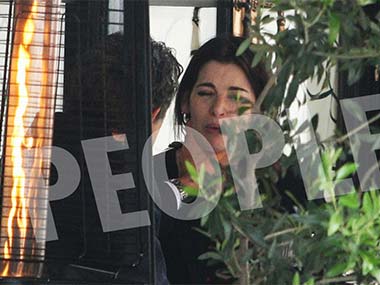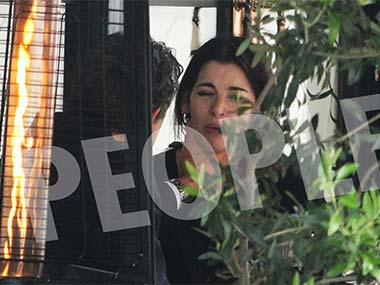“Nigella, like it or not, you’re a beacon for women from all walks of life. If you want us to buy your books and watch your shows on how to run our kitchens, then we need you to make a stand on domestic violence,”
wrote
Australian radio DJ Dee Dee Dunleavy in response to
tabloid photos
of Charles Saatchi in a violent public altercation with his celebrity wife, Nigella Lawson. The photos show a visibly angry Saatchi grabbing a tearful Lawson’s neck, pinching her nose and pushing at her face with his wrists. The row which took place in a chi-chi London restaurant a week ago ended with Saatchi stomping off despite Lawson’s efforts to calm him by kissing his cheek and hands. The next day, she was tweeting out cutesy food shots and the couple were later seen around London, seemingly back on amicable terms. Then the photos went public and Nigella Lawson became the latest celebrity poster child for domestic violence. She joined the ranks of countless beautiful, successful women who have been in widely publicised violent relationships, including Halle Berry, Zeenat Aman, Tina Turner, and most recently Rihanna. [caption id=“attachment_877617” align=“alignleft” width=“380”]
 Screengrab of the photos where Lawson is seen being attacked by her husband. Screengrab from Mirror.co.uk.[/caption] Now, we can’t assume that this one incident — however shocking — proves Lawson is a battered wife. Photos speak volumes but they rarely tell the whole story. No one knows if this was a stray or rare attack or a milder version of the brutality she endures behind closed doors. What we can reasonably conclude is that Saatchi is nowhere close to being a good husband — given both his actions and patent lack of remorse during the assault. And yet it is Lawson not Saatchi who is under fire for being a bad role model. One reason is that Lawson is the big star in this couple. Intimate revelation has become part of the celebrity game, whether the “real me” is willingly bared in a tweet or exposed by an intrusive paparazzi shot. We in turn feel a proprietorial interest in our idols’ personal lives. They owe it to us to make choices that we deem appropriate. Hence, all the silliness about Team Aniston vs Team Jolie that ensued in the aftermath of Brad Pitt’s divorce. The sense of public entitlement is all the greater with a female star who has added responsibility of being a ‘role model.’ Her personal life now held hostage to the needs of other women. Lawson’s great crime was to fail to act in the way Dunleavy imagined her ideal — and imagined — Nigella ought to have:
Screengrab of the photos where Lawson is seen being attacked by her husband. Screengrab from Mirror.co.uk.[/caption] Now, we can’t assume that this one incident — however shocking — proves Lawson is a battered wife. Photos speak volumes but they rarely tell the whole story. No one knows if this was a stray or rare attack or a milder version of the brutality she endures behind closed doors. What we can reasonably conclude is that Saatchi is nowhere close to being a good husband — given both his actions and patent lack of remorse during the assault. And yet it is Lawson not Saatchi who is under fire for being a bad role model. One reason is that Lawson is the big star in this couple. Intimate revelation has become part of the celebrity game, whether the “real me” is willingly bared in a tweet or exposed by an intrusive paparazzi shot. We in turn feel a proprietorial interest in our idols’ personal lives. They owe it to us to make choices that we deem appropriate. Hence, all the silliness about Team Aniston vs Team Jolie that ensued in the aftermath of Brad Pitt’s divorce. The sense of public entitlement is all the greater with a female star who has added responsibility of being a ‘role model.’ Her personal life now held hostage to the needs of other women. Lawson’s great crime was to fail to act in the way Dunleavy imagined her ideal — and imagined — Nigella ought to have:
We think you are strong, beautiful and successful. We imagine your home is warm and smells of cinnamon, and if we dropped in we’d get a hug and a feed. We don’t like to think of you cowering from a thug. A man so boldly abusive he had no qualms about attacking you in public.
Lawson is just the latest female celebrity to be pressured to make highly personal choices under popular duress. In retrospect, Rihanna left Chris Brown after a vicious and widely publicised assault in 2009 mainly because her celebrity image demanded so. “When I realized that my selfish decision for love could result into some young girl getting killed, I could not be easy with that part. I couldn’t be responsible," she told Diane Sawyer in a TV interview . More simply put: Staying with a man who beat her to pulp made for bad PR. Image compulsions, as expected, proved to be a poor check on personal obsession. She eventually went right back to Brown 3 years later, now brandishing her decision as an act of rebellious passion. “I decided it was more important for me to be happy. I wasn’t going to let anybody’s opinion get in the way of that. Even if it’s a mistake, it’s my mistake," Rihanna told Rolling Stone. Given the man’s dubious personal history, Rihanna did indeed make a mistake — but also rightfully asserted her sovereignty. Just because everyone knows about a celebrity’s personal life, it does not give everyone the right to dictate its course — be it for good or bad. It’s all the more wrong to make female stars responsible for the choices of other women — in a way that men rarely are. Back in the 80s, no one ever told Sanjay Khan that he was being a bad male role model when he beat up Zeenat Aman. Decades later, no one is asking Saatchi to apologise for setting a bad example for young boys. They’re too busy bullying Lawson. “I’m a massive Nigella fan, (but) if she wants to be that person that we look up to and we watch, then she also needs to be a leader," claims Dunleavy. It’s a presumptuous and absurd demand to make of a woman who never promised us anything more than a perfect pork loin. How about we place the burden of our self-righteousness where it correctly belongs: on the arrogant 70-year old billionaire philanthropist who attacked a woman in plain view and with sheer impunity.
)